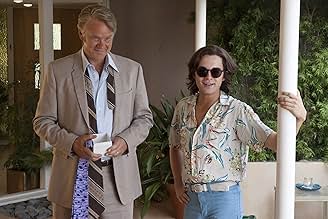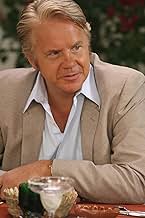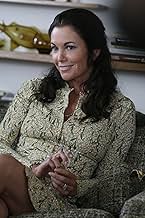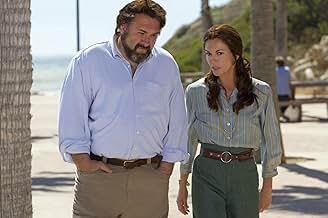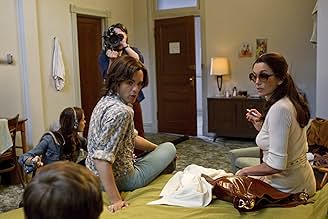NOTE IMDb
6,5/10
4,1 k
MA NOTE
Ajouter une intrigue dans votre langueA behind-the-scenes look at the making of the first American family to be the subjects of a reality TV show.A behind-the-scenes look at the making of the first American family to be the subjects of a reality TV show.A behind-the-scenes look at the making of the first American family to be the subjects of a reality TV show.
- Réalisation
- Scénario
- Casting principal
- Récompensé par 1 Primetime Emmy
- 7 victoires et 34 nominations au total
Avis à la une
Naturally, it doesn't feel real. The first show of its kind, brought America into a debacle of sorts. Was this an "art form" or a voyeuristic trip into the unknown? Now, the whole thing feels manipulated, fragmented and utterly unreal. The gay son, brought the situation into the main stream but it was misunderstood, or was it? The one thing I got out of this films was a superlative performance by Diane Lane. She is truly extraordinary. But the task of reproducing the "moment" feels a bit all over the place. Going from highlight to highlight, if you didn't know about it you still won't really understand. This is no Truman Show. The dramatic structure seems not merely uncertain but downright opportunistic. Needless to say, I was disappointed.
CINEMA VERITE tries very hard to justify the trend it began in the 1970s by having a camera crew move into the household and private life of the well-to-do Loud family in Santa Barbara. The idea of a docudrama about a docudrama is acceptable as a flag for the obsession with Reality TV shows spawned by this experiment. Unfortunately the writing (by David Seltzer - apparently based on the book written by Pat Loud 'A Woman's Story' about the experience) is spotty and the recreation of (1971 when the 'series' was filmed and 1973 when it hit the television screens) reminds us how boring that time frame was. The direction by Shari Springer Berman and Robert Pulcini imitates the dreary 'spontaneity' of live action drama the film addresses. It plods, tripping on the cables for the cameras placed inside the home of this sad story.
Documentary producer Craig Gilbert (James Gandolfini) devises a concept for PBS he calls 'An American Family' and searches for a family that does not depict the happy-wappy family of staged productions but instead inters the privacy of an American family, examining all the aspects of that institution. He selects the Loud family, particularly because he sees Pat Loud (Diane Lane) as an early women's rights activist able to say truths others might avoid. Gilbert paces his documentary to unveil the dirt that hides behind the scenes - motivated to prod Pat to discover Bill (Tim Robbins) her husband's infidelity, which led her to seek a divorce. The Louds have two sons involved in the dream of becoming a rock band, a daughter in the throes of discovering teenage love, and a gay son Lance (Thomas Dekker) who has moved to New York to live a raucous life without the approval of his father but one visited by Pat without complete acceptance. The film crew consists of a married couple - Alan Raymond (Patrick Fugit) and Susan Raymond (Shanna Collins) - who reluctantly agree to film even the most embarrassing scenes of the film. The gradual crumbling of the Loud marriage - not helped by either Gilbert or by Pat's 'friend' Val (Lolita Davidovich) who is actually another one of Bill's affairs - is what producer Gilbert wants to record, and he succeeds. The Louds end their marriage, Lance later dies of AIDS, and the other children have minor successes in their lives. But the overriding feeling of this film is showing how the inquisitive media can be destructive in attempting to share reality with the world at large. And so began the glut of reality shows that yearly grow more irreverent in respecting privacy.
Diane Lane brings moments of brilliance to her role as the manipulated Pat and James Gandolfini is given the opportunity to push his acting chops. The problem is that we all know the quasi-tragic story on which this film is based, and making us witness it again is less than entertaining. It is disturbing.
Grady Harp
Documentary producer Craig Gilbert (James Gandolfini) devises a concept for PBS he calls 'An American Family' and searches for a family that does not depict the happy-wappy family of staged productions but instead inters the privacy of an American family, examining all the aspects of that institution. He selects the Loud family, particularly because he sees Pat Loud (Diane Lane) as an early women's rights activist able to say truths others might avoid. Gilbert paces his documentary to unveil the dirt that hides behind the scenes - motivated to prod Pat to discover Bill (Tim Robbins) her husband's infidelity, which led her to seek a divorce. The Louds have two sons involved in the dream of becoming a rock band, a daughter in the throes of discovering teenage love, and a gay son Lance (Thomas Dekker) who has moved to New York to live a raucous life without the approval of his father but one visited by Pat without complete acceptance. The film crew consists of a married couple - Alan Raymond (Patrick Fugit) and Susan Raymond (Shanna Collins) - who reluctantly agree to film even the most embarrassing scenes of the film. The gradual crumbling of the Loud marriage - not helped by either Gilbert or by Pat's 'friend' Val (Lolita Davidovich) who is actually another one of Bill's affairs - is what producer Gilbert wants to record, and he succeeds. The Louds end their marriage, Lance later dies of AIDS, and the other children have minor successes in their lives. But the overriding feeling of this film is showing how the inquisitive media can be destructive in attempting to share reality with the world at large. And so began the glut of reality shows that yearly grow more irreverent in respecting privacy.
Diane Lane brings moments of brilliance to her role as the manipulated Pat and James Gandolfini is given the opportunity to push his acting chops. The problem is that we all know the quasi-tragic story on which this film is based, and making us witness it again is less than entertaining. It is disturbing.
Grady Harp
This film speaks volumes about the ethical dilemmas doc-makers (and "reality TV" producers) all-too-frequently face. Some choose to do the ethical thing and tell an unvarnished truth, most are happy to sell their soul for ratings. Strong filmmaking from the folks who brought us American Splendor and have now once again cut to the heart of the American Dream. If you watch "reality TV" and believe it, this is mandatory viewing. Diane Lane will break your heart, Tim Robbins shatters deeply held delusions about the Playboy/Esquire lifestyle and James Gandofini's strong performance is a scream in the dark urging us to dump the junk TV and watch more substantial fare. This is great American filmmaking.
"Cinema Verite" may be a new art form: a drama shot in semi-documentary style about a documentary series (shot in 1971, televised nationally in 1973) which itself hovered between the spontaneous and the rehearsed. This 90-minute effort takes about a third of its running time time to get off the ground, but when it does it becomes fascinating as both sociology and drama.
At first it seems as if there is no point in re-enacting the back story to the famous series that followed the ups and downs of the upper-middle-class Loud family of Santa Barbara. Nothing particularly interesting happens as a producer (James Gandolfini) talks a married couple (Diane Lane and Tim Robbins) into allowing cameras into their lives for an unprecedentedly close look at the perfect American family. The real drama begins only when the participants are forced to grapple with the big choices (what and what not to film, what and what not to do when the camera is rolling, how to handle the fact that their lives have decisively changed once the cameras entered). The actors here give themselves totally to this multi-leveled process and come out with flying colors.
We see the actual Loud family in snippets from the original series juxtaposed with their contemporary impersonators who seamlessly fill their shoes, sometimes in mid- conversation. The casting is very good; the resemblances are striking. (But as close a match as Diane Lane is to Pat Loud, Demi Moore would have been even closer.) Some clever member of the creative team even decided to frame the whole enterprise with Mama Cass's 1969 song hit "Dream a Little Dream of Me" (originally a hit in 1931, about 40 years before "An American Family"'s time), allowing the song to surface again, 40 more years down the road, as underscoring to an examination of "the first reality show." A neat touch.
One thing they got wrong was the performance of the underground play "Vain Victory" which the mother attends in the company of her gay son, Lance. The performers and venue for such ragtag productions were a lot funkier than depicted in this otherwise spot-on production. Of course, by 2011 cultural standards such drag acts are as tame and commonplace as Twinkies, but they were enough to drive Pat Loud out of the room back in '71.
At first it seems as if there is no point in re-enacting the back story to the famous series that followed the ups and downs of the upper-middle-class Loud family of Santa Barbara. Nothing particularly interesting happens as a producer (James Gandolfini) talks a married couple (Diane Lane and Tim Robbins) into allowing cameras into their lives for an unprecedentedly close look at the perfect American family. The real drama begins only when the participants are forced to grapple with the big choices (what and what not to film, what and what not to do when the camera is rolling, how to handle the fact that their lives have decisively changed once the cameras entered). The actors here give themselves totally to this multi-leveled process and come out with flying colors.
We see the actual Loud family in snippets from the original series juxtaposed with their contemporary impersonators who seamlessly fill their shoes, sometimes in mid- conversation. The casting is very good; the resemblances are striking. (But as close a match as Diane Lane is to Pat Loud, Demi Moore would have been even closer.) Some clever member of the creative team even decided to frame the whole enterprise with Mama Cass's 1969 song hit "Dream a Little Dream of Me" (originally a hit in 1931, about 40 years before "An American Family"'s time), allowing the song to surface again, 40 more years down the road, as underscoring to an examination of "the first reality show." A neat touch.
One thing they got wrong was the performance of the underground play "Vain Victory" which the mother attends in the company of her gay son, Lance. The performers and venue for such ragtag productions were a lot funkier than depicted in this otherwise spot-on production. Of course, by 2011 cultural standards such drag acts are as tame and commonplace as Twinkies, but they were enough to drive Pat Loud out of the room back in '71.
These reality show movies are hard to watch. I did not hear about the Louds before. But it would have been interesting to watch what went wrong with America's sweetheart family. However, the script did not have enough punch to hold the interest for the entire time. James Gandolfini is such a good actor. He made an unlikeable character tolerable. Diane Lane was not quite believable as a gullible, wronged woman. Tim Robbins was watchable, however something was missing and I just didn't believe in his character. It started out fine, had a lot of potential when it moved to Manhattan, but somewhere down the second act, it lost its grip. Wish it had the momentum going somehow. Alas, it didn't end too well for me.
Le saviez-vous
- AnecdotesIn the scene where Lance Loud is on the phone with his family, he reads a media description of himself and his "flamboyant, leech-like homosexuality". That's a direct quote from an article written for The New York Times by Anne Roiphe. She made equally scathing remarks about the entire Loud family.
- GaffesThe Louds' Mercedes has a California plate with the number style 1AAA000. These plates did not appear until 1980.
- ConnexionsFeatured in The Tonight Show with Jay Leno: Épisode #19.129 (2011)
- Bandes originalesDream A Little Dream
Written by Fabian Andre, Gus Kahn & Wilbur Schwandt
Performed by Cass Elliot (as Mama Cass)
Courtesy of Geffen Records under license from Universal Music Enterprises
Meilleurs choix
Connectez-vous pour évaluer et suivre la liste de favoris afin de recevoir des recommandations personnalisées
Détails
- Durée
- 1h 26min(86 min)
- Couleur
- Mixage
- Rapport de forme
- 1.78 : 1
Contribuer à cette page
Suggérer une modification ou ajouter du contenu manquant


